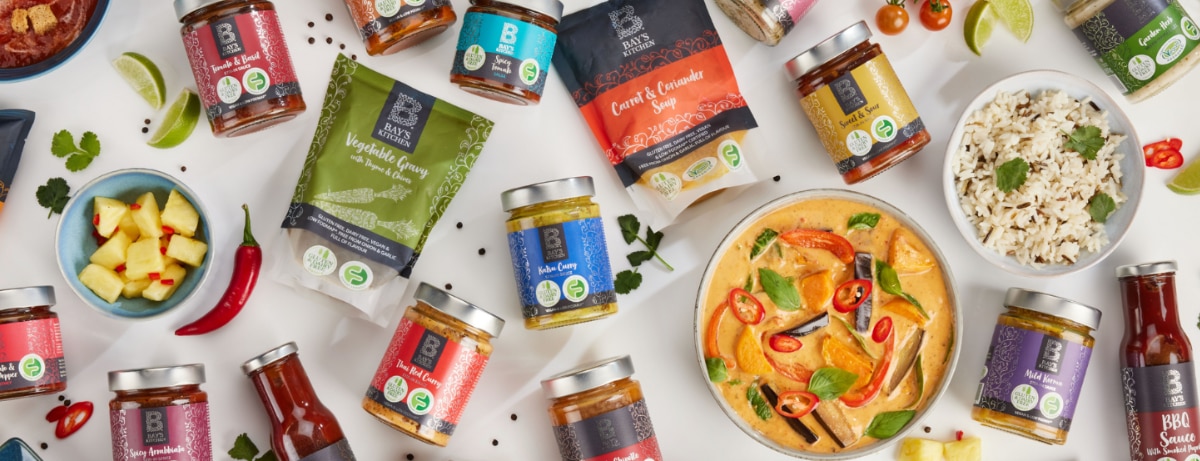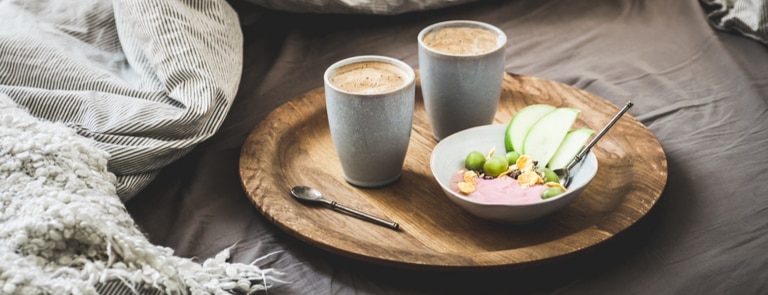15% off £30 OR 20% off £40
Digestive Issues, IBS & the Low FODMAP Diet

Written by Bay Burdett, Founder of Bay’s Kitchen
In this article we will explore Digestive Issues, IBS and the Low FODMAP Diet and how Bay’s Kitchen, the IBS Friendly Food brand, can help.
Over 40% of the UK population suffer from digestive problems at any one time and this can negatively impact their quality of life1. Also, over 40% of people in the UK have a food allergy or intolerance2. These all have an impact on quality of life and mean eating all together as a family has never been more difficult.
One particular digestive problem that 20% of the population3 suffer with is IBS (Irritable Bowel Syndrome).
What is IBS?
- Cramping
- Bloating
- Change in bowel habits
- Wind
- Tiredness
IBS cannot be cured but there are many things that can help to manage and reduce the digestive discomfort from IBS symptoms.
A diet that is scientifically proven to reduce symptoms is the Low FODMAP Diet. It is now recommended by most medical professionals including doctors, GPs and dietitians6. I, the founder of Bay’s Kitchen, was recommended to follow the Low FODMAP Diet when I was diagnosed with IBS in 2015.
What is the Low FODMAP Diet?
FODMAP stands for ‘Fermentable Oligosaccharides, Disaccharides, Monosaccharides and Polyols’, which are a specific group of sugars naturally found in foods and are hard to digest, therefore irritate the gut and cause IBS symptoms. Foods high in these sugars are called High FODMAP Foods. A Low FODMAP Diet limits the intake of high FODMAP foods to help improve IBS flare-ups.
Examples of High FODMAP Foods7:
- Onion
- Garlic
- Cauliflower
- Apples
- Cherries
- Cow’s Milk
- Honey
Research has found that the diet reduces symptoms in up to 86% of people who try it8. A Low FODMAP Diet consists of three different phases. These are:
This should only last 4-6 weeks with all moderate and high FODMAP foods being removed from your diet. This should improve IBS symptoms.
This is where you add those moderate and high FODMAP ingredients back into your diet, one at a time and note down all of your symptoms to find patterns. This should allow you to determine what foods you can tolerate and which ones are causing the IBS symptoms.
Now you know what triggers your IBS, you should be able to make informed food decisions and avoid consuming the ingredients that are causing your symptoms to get worse. It’s important to bring as many foods back into your diet as possible to make it varied which is better for your gut. You may find during the re-introduction stage that a small portion of a certain food is ok, but a larger one isn’t, so you would continue just having the smaller portion you can tolerate.
Creating your personalised diet should give you much more control over your IBS flare-ups and give you a better quality of life. Don’t forget other elements can also impact IBS including9:
- Stress
- Alcohol consumption
- Caffeine
- Medication
- A lack of exercise
It is important to remember that these can also be causing your IBS symptoms to worsen, so ensure you are making notes on all areas, not just food intake. Bay’s Kitchen’s Food & Symptom Diary is a great way to track all of these elements and record your progress.

How does the Low FODMAP Diet help IBS?
By removing FODMAPs from your diet, you avoid this extra gas production and irritation to the gut, resulting in less digestive discomfort and flare-ups. There are 4 types of FODMAPS – Fructose, Lactose, Fructans and Polyols. You may only be sensitive to one of these groups, or maybe a few. Therefore by adding each high FODMAP food (ideally only high in one area e.g. lactose) into your diet in isolation during the reintroduction phase, it allows you to determine which type of FODMAPs you are most sensitive to and therefore discover which foods are causing an increase in your symptoms.
Although the Low FODMAP Diet can greatly help IBS, it isn’t for everyone, and you should always seek medical advice before you start. Due to the number of foods that are eliminated, it’s also recommended that you talk to a dietitian to get meal plans to ensure you are getting enough fibre and nutrients. The diet is very restrictive, and you should not be stay in the elimination phase for more than 6 weeks as this can harm your gut microbiome and cause more damage to your gut. This is why you must move onto the reintroduction phase of the diet.
How can Bay’s Kitchen help?
Our Founder’s Story:
I, Bay Burdett, the Founder & CEO of Bay’s Kitchen had been suffering for many years with uncomfortable symptoms. In 2015 this was impacting the quality of my life and I sought medical advice. I was diagnosed with IBS and recommended to follow the Low FODMAP Diet. There were virtually no convenient, Low FODMAP Food options that were readily available in the UK so I began making every meal from scratch. This was completely unachievable with my busy lifestyle, however with the Low FODMAP Diet improving my symptoms I knew I needed to continue. I knew that there must be more people out there looking for convenient and IBS Friendly foods. Therefore, I decided to develop my own Low FODMAP Foods without compromising on taste or quality… and so Bay’s Kitchen was born with the aim to create products to help fellow IBS sufferers.
Bay’s Kitchen, the IBS Friendly, Gluten Free & Dairy Free Food Brand:
Bay’s Kitchen creates award-winning IBS friendly food products that are made without hard-to-digest ingredients like onion and garlic. All products are certified FODMAP Friendly11 and are therefore, safe to consume during every phase of the Low FODMAP Diet. They are also certified Gluten Free and Dairy Free12, with many being Vegan Approved too13. These foods enable those with digestive issues to eat with ease without compromising on taste or quality and allow friends and families to eat together again no matter what their dietary requirements are.
We have focussed on taste of our products to ensure whether you are following the diet or not, they are enjoyable, and our multiple awards speak for themselves! Some of our best-selling available through Holland & Barrett are:
- https://gutscharity.org.uk/wp-content/uploads/2016/08/DigestingTheFactsReport.pdf
- https://www.allergyuk.org/about-allergy/statistics-and-figures/
- https://transform.england.nhs.uk/key-tools-and-info/digital-playbooks/gastroenterology-digital-playbook/remote-monitoring-of-patients-with-small-intestinal-bacterial-overgrowth-IBS-and-food-intolerances/
- https://www.circlehealthgroup.co.uk/health-matters/womens-health/ibs-facts-for-sufferers
- https://www.nhs.uk/conditions/irritable-bowel-syndrome-ibs/symptoms/
- https://healthpath.com/gut-health/nhs-fodmap-complete-guide/
- https://www.monashfodmap.com/about-fodmap-and-ibs/
- https://www.hopkinsmedicine.org/health/wellness-and-prevention/fodmap-diet-what-you-need-to-know
- https://www.nhsinform.scot/illnesses-and-conditions/stomach-liver-and-gastrointestinal-tract/irritable-bowel-syndrome-ibs
- https://www.monashfodmap.com/about-fodmap-and-ibs/
- https://fodmapfriendly.com/fodmap_products-category/bays-kitchen/
- http://micro-search.co.uk/
- https://vegsoc.org/approved-companies/bays-kitchen/
















